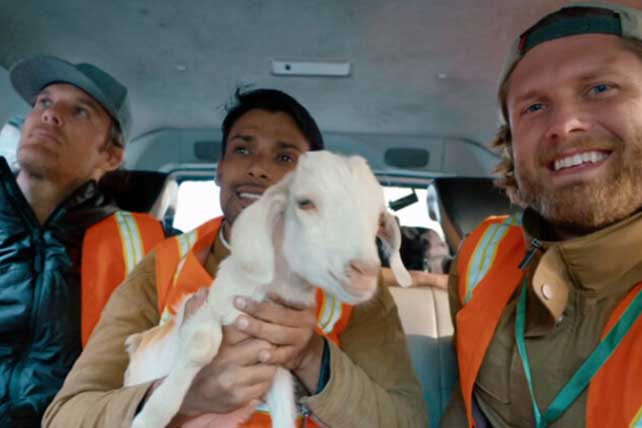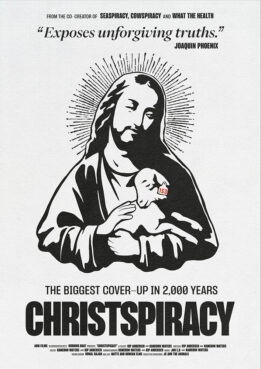(RNS) — Is there an ethical or spiritual way to kill an animal?
That’s the question that animates “Christspiracy: The Spirituality Secret,” the forthcoming documentary that suggests Jesus and many of his early followers opposed the killing and eating of animals. This bombshell truth, the filmmakers argue, is part of “the biggest coverup in the last 2,000 years.”
The film’s premise may be controversial, but the minds behind it are no strangers to contention. Filmmaker Kip Andersen also co-created the hit documentaries “Seaspiracy,” “Cowspiracy” and “What the Health,” provocative exposés of the fishing, dairy and meat industries. These earlier films garnered countless views and plenty of backlash — but indisputably left an impression.
Still, by adding religion to the mix, Andersen expects to upset even more people. According to a Kickstarter campaign, which has raised a little over $433,000 of its $300,000 goal, the filmmakers claim they parted ways with Netflix after the platform asked for redactions from the film. Andersen said this led him and fellow filmmaker Kameron Waters to buy back the rights to their film.
RELATED: Pastor Rescues North Korean Defectors on Foot in New Documentary ‘Beyond Utopia’
Waters told RNS in an email that the pair “wanted to tell the story the way it was unfolding.” Netflix, he claimed, wanted to go a different direction, including “some particular parts they preferred cut that we didn’t agree with as we feel they are vital to the narrative, especially around Christ.”
Poster for “Christspiracy.” (Image courtesy Christspiracy)
On Wednesday (March 20), the film will show in a one-night-only event in over 650 theaters worldwide; in the U.S., the film will also show on March 24.
Seven years in the making, the fast-paced film tracks Andersen, a self-described “quasi-spiritual Buddhist yogi,” and Waters, a onetime Southern Baptist and gospel musician, as they seek new insights about the compatibility of religion and meat eating. The pair go from investigating a Kosher farm in Israel to tracking a cow-smuggling truck in New Delhi, examining the spiritual frameworks people employ while eating, farming, selling and slaughtering animals.
Amid the film’s many action shots, its through-line is the case for Christ’s opposition to eating and killing animals. The evidence includes an interpretation of Jesus’ well-documented cleansing of the temple. Animal theologian Andrew Linzey and James Tabor, a retired religious studies professor from the University of North Carolina at Charlotte, suggest in the documentary that the temple was operating as a commercial slaughterhouse in Jesus’ time. When the gospels record Jesus calling the temple a den of thieves, he’s quoting Jeremiah 7, a passage that references idols and animal sacrifice. In the film, Oxford scholar Deborah Rooke translates the Hebrew word “parits,” often interpreted as “thieves,” as meaning “violent one.” This, the film claims, shows that Jesus was condemning animal sacrifice.
“The fact that four days before he was crucified, he goes in and shuts down the temple to basically stop animal sacrifice … he was one of the most hardcore animal activists, the ‘OG’ animal activist,” Andersen told RNS in a Zoom call.
RELATED: Rob Reiner Documentary on Christian Nationalism Features Interviews With Prominent Evangelicals
In the documentary, the filmmakers say Jesus not only sacrificed his life for humans, “but to stop the killing of animals as well.”
In another part of the film, Keith Akers, an activist and author of “The Lost Religion of Jesus” (2000), refers to early sources that characterize Jesus’ brother James and cousin John the Baptist as vegetarian. “Jesus is simply carrying on the family tradition,” he says.
The film also cites early descriptions of the Ebionites, a sect that described Jesus as an opponent of animal sacrifice who refused to eat lamb during Passover. According to the 4th-century bishop Epiphanius, who condemned the Ebionites, the group also denied the divinity of Christ. Some scholars, including Robert Eisenman, also featured in the film, have characterized the Ebionites as followers of Jesus’ brother, James.


